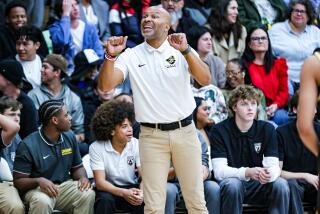Coaches Need to Enter the Game Against Alcohol
- Share via
Every high school coach must accept responsibility for dealing with the uncomfortable subject of teenage drinking.
Too often, coaches have either closed their eyes or relinquished authority when confronted with the issue.
Equally troubling is a failure by coaches to properly educate athletes about the dangers of drinking, perhaps because they feel it is the parents’ responsibility.
But sometimes parents are unaware of a problem or are unwilling to take action. That’s when coaches should provide guidance on an issue that can tear apart families and disrupt young people’s lives.
In big bold letters, with permanent ink, it should be written in the coaching manual that before every season, a head coach must talk about the dangers of alcohol to athletes. Later in the season, there should be a follow-up, reaffirming the consequences at stake.
Coaches already have demanding schedules, from figuring out Xs and Os, to daily teaching assignments, to watching over their athletes. But the matter of teenage drinking can’t be ignored.
Last month in the Santa Clarita Valley, three former high school football standouts were arrested for driving under the influence. All are in their 20s and old enough to make their own decisions.
Blaming the coach for the actions of players or ex-players off the field is inappropriate, but the coach is no innocent bystander, either. At some point, when the drinking begins, whether it’s in the teenage years or earlier, counseling is needed. If parents can’t get through, then the coach is obligated to take on the task.
It’s up to the coach to create an environment where teammates gain strength from each other and use reverse peer pressure to collectively say no to alcohol.
It doesn’t always work. Steve Johnson, boys’ basketball coach at Newbury Park High, made it clear that his school has a zero-tolerance policy for teenage drinking. But five players chose to ignore the rule during a school trip to Las Vegas in December and were removed from the team.
Incredibly, some people criticized Johnson for his supposedly “harsh” punishment. On the contrary, he’s a hero for sticking to his beliefs and reinforcing the notion that playing sports is a privilege, not a right.
There was something good that came out of the Newbury Park incident. Other Panther players rejected alcohol. They encountered peer pressure to drink and used their self-confidence and intelligence to say no. They decided playing basketball was more important than consuming alcohol.
Teenagers drink for different reasons--to join the crowd, to escape reality, to try something new.
Parents bear the primary burden of teaching their children alternatives to alcohol.
But the dangers of teenage drinking require coaches getting involved.
There will be times when a coach lectures athletes about alcohol and the teenagers leave the meeting giggling and making jokes, as if they don’t take the issue seriously.
Coaches can’t force athletes to heed their warnings about alcohol, but at least they should try.
Too many young lives are at stake.
Eric Sondheimer’s local column appears Wednesday and Sunday. He can be reached at eric.sondheimer@latimes.com
More to Read
Get our high school sports newsletter
Prep Rally is devoted to the SoCal high school sports experience, bringing you scores, stories and a behind-the-scenes look at what makes prep sports so popular.
You may occasionally receive promotional content from the Los Angeles Times.







